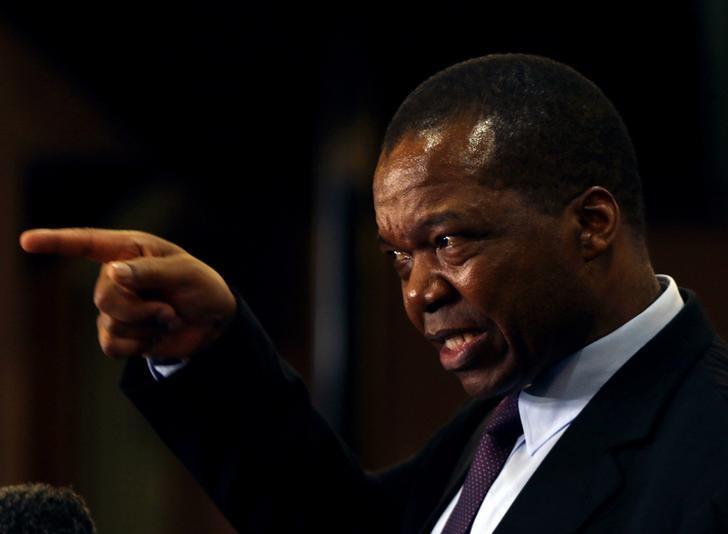Zim cannot sustain full dollarisation, says RBZ
RESERVE Bank of Zimbabwe (RBZ) Governor, Dr John Mangudya, has urged Zimbabweans to embrace the local currency saying the country has no capacity to sustain a fully dollarised economy.
While the Government has allowed use of foreign currency as an official medium of exchange alongside the Zimbabwean dollar, at least up to 2025 with the ultimate goal to return to an exclusively domestic currency regime, some economic players are aggressively pushing for full dollarisation citing the rapid depreciation of the local unit.
Authorities, however, say the dual currency system is serving a good economic purpose as a transitional measure, and have boldly indicated that the long-term objective is to dedollarise.
With such a scenario, speculative market forces have been taking advantage of the window to fuel parallel market exchange rate volatility, which has led to price escalation of prices and erosion of consumer purchasing power.
Speaking here during a conference organised by the Chamber of Mines of Zimbabwe, Dr Mangudya said Zimbabwe had about US$2,4 billion bank deposits, and half of it is kept in foreign currency accounts by financial institutions to fund the needs of exporters, mostly mining companies.
He said over 70 percent of Zimbabwe’s exports come from the mining sector and the money generated did not belong to the Treasury, as opposed to the general notion that the country generated enough foreign currency to be able to sustain full dollarisation.
His sentiments followed concerns by participants at the conference that the Government was not releasing foreign currency for the importation of electricity, among other challenges faced by the mining sector.
Power utility, Zesa, is failing to import electricity because of lack of foreign currency, among other challenges. The situation is militating against productivity in the mining sector, which requires about 2 000MW.
Dr Mangudya said the mining sector was critical to the economy as its earnings had helped revive the manufacturing sector and breathed life into many companies, some of whose premises had for some time been turned into churches.
He said it was contradictory and ironic that a country that has no foreign currency to import electricity would want to fully dollarise its economy.
To him, it is a few individuals and exporters that want the economy dollarized and move away from a multi-currency system.
“Because you are consistently exporting, people say we can now dollarise. This money is not ours-it belongs to the exporter,” said Dr Mangudya.
“It means that we have no capacity to dollarise because already we have a shortage.”
The RBZ Governor said the best solution was for citizens to embrace the current monetary system and have confidence in their own local currency. The Government has always expressed concern over citizens’ lack of confidence in the local currency and has chided businesses and individuals that inflate prices of goods in local currency as a desperate way to discourage local dollar usage.
As such, Dr Mangudya said there was a need for stakeholders to fully embrace the local currency for local purchases and spare foreign currency for the importation of electricity and other critical goods and services.
“The country has no sufficient foreign currency to dollarise. As you heard Zesa cannot import enough electricity because there is no foreign currency,” he said.
“What it means is that what people are asking for, we have no capacity to dollarise. We have more than US$2,4 billion in our deposits and of those deposits, US$1,4 billion is in banks as liquidity for them to fund their customers,” said the Governor.
“That money belongs to a few people and companies that are the largest exporters. Most of the money belongs to the mining sector so it means we don’t have foreign currency. So, people who want (us) to dollarise are individuals but we don’t have capacity and what it means is that we need to embrace our local currency for local purchases so we reserve foreign currency for imports,” said Dr Mangudya.
He said there is a need for more robust discussions on the way forward as a country, noting that the demand in the economy for electricity shows lack of capacity to import enough power, and appealed to citizens to understand that numbers do not lie.
He said the market clearing exchange rates only focus on clearing foreign payments and not domestic payments hence there is rampant duplication of resources for local payments and foreign payments.
Dr Mangudya further said the Government had refined the auction system by selling the little money available through the willing buyer willing seller thereby narrowing the gap between the official exchange rate and parallel rate, which are now almost aligned.
The wider gap is responsible for soaring prices of commodities, which will soon become a thing of the past, he said.
The mining conference proceedings ended yesterday and today delegates will participate in a golf tournament.
-ebusinessweekly











